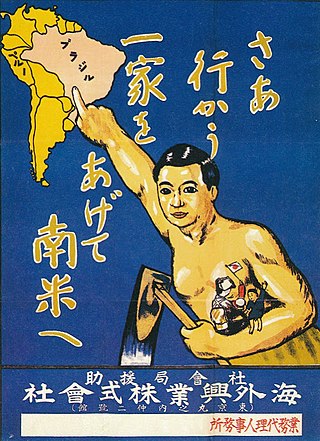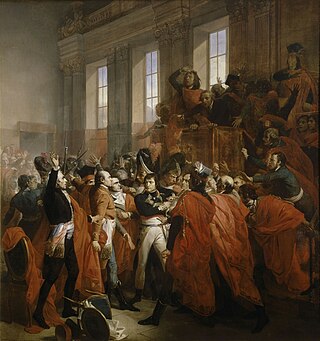Related Research Articles

Autocracy is a system of government in which absolute power over a state is concentrated in the hands of one person, whose decisions are subject neither to external legal restraints nor to regularized mechanisms of popular control.

Emigration is the act of leaving a resident country or place of residence with the intent to settle elsewhere. Conversely, immigration describes the movement of people into one country from another. A migrant emigrates from their old country, and immigrates to their new country. Thus, both emigration and immigration describe migration, but from different countries' perspectives.
Accountability, in terms of ethics and governance, is equated with answerability, blameworthiness, liability, and the expectation of account-giving. As in an aspect of governance, it has been central to discussions related to problems in the public sector, nonprofit and private (corporate) and individual contexts. In leadership roles, accountability is the acknowledgment and assumption of responsibility for actions, products, decisions, and policies including the administration, governance, and implementation within the scope of the role or employment position and encompassing the obligation to report, justify and be answerable for resulting consequences.
In political science, a political system means the type of political organization that can be recognized, observed or otherwise declared by a state.

In political science, legitimacy is the right and acceptance of an authority, usually a governing law or a regime. Whereas authority denotes a specific position in an established government, the term legitimacy denotes a system of government—wherein government denotes "sphere of influence". An authority viewed as legitimate often has the right and justification to exercise power. Political legitimacy is considered a basic condition for governing, without which a government will suffer legislative deadlock(s) and collapse. In political systems where this is not the case, unpopular regimes survive because they are considered legitimate by a small, influential elite. In Chinese political philosophy, since the historical period of the Zhou Dynasty, the political legitimacy of a ruler and government was derived from the Mandate of Heaven, and unjust rulers who lost said mandate therefore lost the right to rule the people.
An illiberal democracy describes a governing system that hides its "nondemocratic practices behind formally democratic institutions and procedures". There is a lack of consensus among experts about the exact definition of illiberal democracy or whether it even exists.
Political repression is the act of a state entity controlling a citizenry by force for political reasons, particularly for the purpose of restricting or preventing the citizenry's ability to take part in the political life of a society, thereby reducing their standing among their fellow citizens. Repression tactics target the citizenry who are most likely to challenge the political ideology of the state in order for the government to remain in control. In autocracies, the use of political repression is to prevent anti-regime support and mobilization. It is often manifested through policies such as human rights violations, surveillance abuse, police brutality, imprisonment, involuntary settlement, stripping of citizen's rights, lustration, and violent action or terror such as the murder, summary executions, torture, forced disappearance, and other extrajudicial punishment of political activists, dissidents, or general population. Direct repression tactics are those targeting specific actors who become aware of the harm done to them while covert tactics rely on the threat of citizenry being caught. The effectiveness of the tactics differ: covert repression tactics cause dissidents to use less detectable opposition tactics while direct repression allows citizenry to witness and react to the repression. Political repression can also be reinforced by means outside of written policy, such as by public and private media ownership and by self-censorship within the public.
Transnationalism is a research field and social phenomenon grown out of the heightened interconnectivity between people and the receding economic and social significance of boundaries among nation states.
Diaspora politics in the United States is the political behavior of transnational diasporas of ethnic groups, their relationship with their ethnic homelands and their host states, as well as their prominent role in ethnic conflicts. This article describes case studies and theories of political scientists studying diaspora politics within the specific context of the United States. The general study of diaspora politics is part of the broader field of diaspora studies.

The International Criminal Police Organization, commonly known as Interpol, is an international organization that facilitates worldwide police cooperation and crime control. It is the world's largest international police organization. It is headquartered in Lyon, France, with seven regional bureaus worldwide, and a National Central Bureau in all 195 member states.
Egyptian diaspora consists of citizens of Egypt abroad sharing a common culture and Egyptian Arabic language.
Authoritarianism is a political system characterized by the rejection of political plurality, the use of strong central power to preserve the political status quo, and reductions in the rule of law, separation of powers, and democratic voting. Political scientists have created many typologies describing variations of authoritarian forms of government. Authoritarian regimes may be either autocratic or oligarchic and may be based upon the rule of a party or the military. States that have a blurred boundary between democracy and authoritarianism have some times been characterized as "hybrid democracies", "hybrid regimes" or "competitive authoritarian" states.

A coup d'état, also known as a coup, is an illegal and overt attempt by the military or other government elites to unseat the incumbent leader. A self-coup is when a leader, having come to power through legal means, tries to stay in power through illegal means.
Feudal fascism, also revolutionary-feudal totalitarianism, were official terms used by the post-Mao Zedong Chinese Communist Party to designate the ideology and rule of Lin Biao and the Gang of Four during the Cultural Revolution. In 1979, the Chairman of the Standing Committee of the National People's Congress, Ye Jianying, described Mao Zedong's reign as a “feudal-fascist dictatorship” due to his revolutionary terror-based cult of personality, nationalism and authoritarianism despite superficially socialist policies.
Anocracy, or semi-democracy, is a form of government that is loosely defined as part democracy and part dictatorship, or as a "regime that mixes democratic with autocratic features". Another definition classifies anocracy as "a regime that permits some means of participation through opposition group behavior but that has incomplete development of mechanisms to redress grievances." The term "semi-democratic" is reserved for stable regimes that combine democratic and authoritarian elements. Scholars distinguish anocracies from autocracies and democracies in their capability to maintain authority, political dynamics, and policy agendas. Similarly, the regimes have democratic institutions that allow for nominal amounts of competition. Such regimes are particularly susceptible to outbreaks of armed conflict and unexpected or adverse changes in leadership.
A hybrid regime is a type of political system often created as a result of an incomplete democratic transition from an authoritarian regime to a democratic one. Hybrid regimes are categorized as having a combination of autocratic features with democratic ones and can simultaneously hold political repressions and regular elections. Hybrid regimes are commonly found in developing countries with abundant natural resources such as petro-states. Although these regimes experience civil unrest, they may be relatively stable and tenacious for decades at a time. There has been a rise in hybrid regimes since the end of the Cold War.

The Corrective Revolution was a reform program launched on 15 May 1971 by President Anwar Sadat. It involved purging Nasserist members of the government and security forces, often considered pro-Soviet and left-wing, and drumming up popular support by presenting the takeover as a continuation of the Egyptian Revolution of 1952, while at the same time radically changing track on issues of foreign policy, economy, and ideology. This includes a large shift in Egyptian diplomacy, building ties to the United States and Israel, while breaking from the USSR and, after signing the Egyptian-Israeli Peace Treaty, Egypt's subsequent suspension from the Arab League.

Democratic backsliding, also called autocratization, is "a process of regime change towards autocracy that makes the exercise of political power more arbitrary and repressive and that restricts the space for public contestation and political participation in the process of government selection". Democratic decline involves the weakening of democratic institutions, such as the peaceful transition of power or free and fair elections, or the violation of individual rights that underpin democracy, especially freedom of expression.
Authoritarian capitalism, or illiberal capitalism, is an economic system in which a capitalist market economy exists alongside an authoritarian government. Related to and overlapping with state capitalism, a system in which the state undertakes commercial activity, authoritarian capitalism combines private property and the functioning of market forces with repression of dissent, restrictions on freedom of speech and either a lack of elections or an electoral system with a single dominant political party.
Operation Fox Hunt is a Chinese covert global operation whose purported aim is anti-corruption under Chinese Communist Party general secretary Xi Jinping's administration. As of 2017, it has led to the arrest of over 40 of its 100 most wanted globally. The program has been accused of targeting Chinese dissidents living abroad to stop their activism under the guise of returning corrupt Chinese nationals to China to face criminal charges.
References
- ↑ Tsourapas, Gerasimos (2019). "A Tightening Grip Abroad: Authoritarian Regimes Target Their Emigrant and Diaspora Communities". Migration Policy Institute .
{{cite web}}: CS1 maint: url-status (link) - ↑ Baser, Bahar; Ozturk, Ahmet Erdi (2020-07-02). "Positive and Negative Diaspora Governance in Context: From Public Diplomacy to Transnational Authoritarianism". Middle East Critique . 29 (3): 319–334. doi:10.1080/19436149.2020.1770449. ISSN 1943-6149. S2CID 219747605.
- ↑ De Guzman, Chad (2023-04-18). "U.S. Charges Chinese Operatives With 'Transnational Repression': What to Know". Time . Retrieved 2023-06-26.
- ↑ "Defending Democracy in Exile". Freedom House . Retrieved 2022-08-19.
- ↑ "Transnational Repression". Federal Bureau of Investigation . Retrieved 2023-06-26.
- ↑ "Out of Sight, Not Out of Reach". Freedom House . Retrieved 2021-02-24.
- ↑ Brand, Laurie A. (2006-02-27). Citizens Abroad: Emigration and the State in the Middle East and North Africa (1 ed.). Cambridge University Press. doi:10.1017/cbo9780511491498. ISBN 978-0-521-85805-2. OCLC 967481251.
- ↑ Tsourapas, Gerasimos (2021). "Global Autocracies: Strategies of Transnational Repression, Legitimation, and Co-Optation in World Politics". International Studies Review . 23 (3): 616–644. doi: 10.1093/isr/viaa061 .
- ↑ Moss, Dana M. (2016-09-19). "Transnational Repression, Diaspora Mobilization, and the Case of The Arab Spring". Social Problems . 63 (4): 480–498. doi: 10.1093/socpro/spw019 . ISSN 0037-7791.
- ↑ "New Law Protects Those Who Call Out Corruption". Transparency International . December 27, 2021. Retrieved 2023-06-26.
- ↑ "Helsinki Commission Welcomes Passage of Trap Provision in 2022 National Defense Authorization Act". Commission on Security and Cooperation in Europe . 2021-12-15. Retrieved 2023-06-26.
- ↑ "Transnational Repression Accountability and Prevention (TRAP) Act Reports". U.S. Department of State . June 2, 2023. Retrieved June 25, 2023.
{{cite web}}: zero width space character in|title=at position 56 (help)CS1 maint: url-status (link)